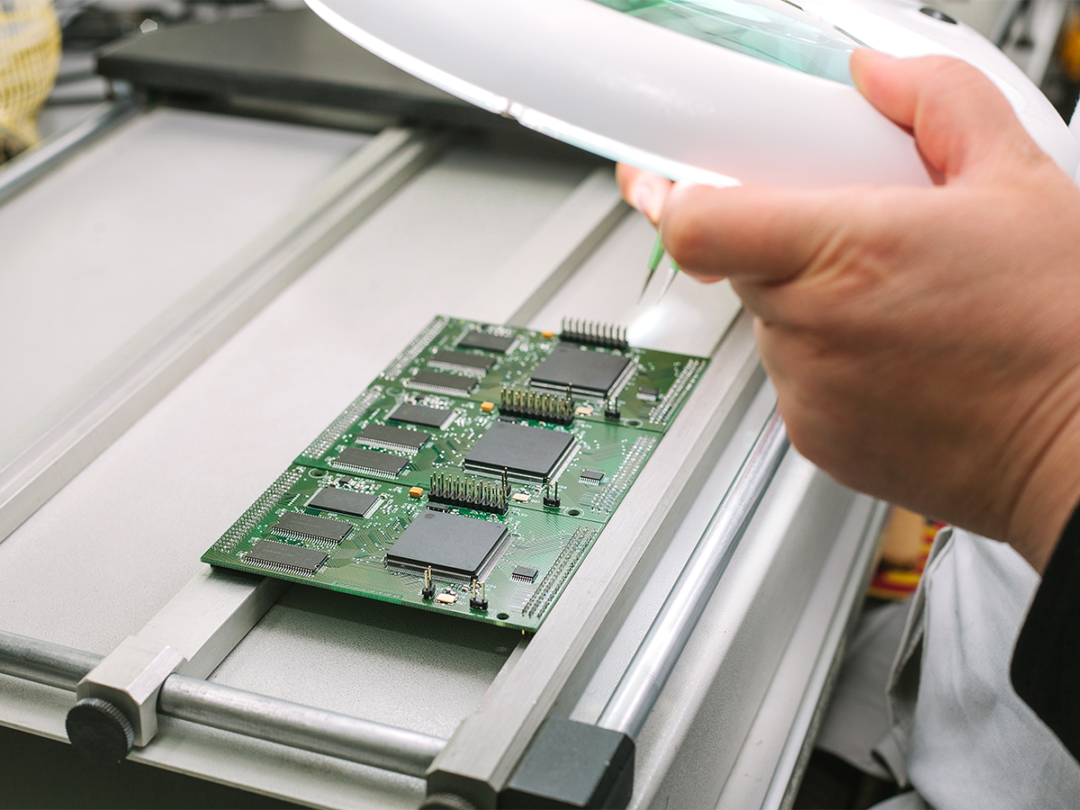
Think Tank
Government Intervention Can Mitigate the Impact of the Chip Shortage

A worker inspects a circuit board at a chip manufacturing plant. Photo: Getty.
During the COVID-19 pandemic, the emergence of a work-from-home business model has given rise to an increased need for microchips. Heightened consumer demand for chip-dependent products such as autos and home appliances has overloaded an already delicate system.
In response, the U.S. Senate passed the U.S. Innovation and Competition Act, while the House approved the America COMPETES Act. Both measures have considerable similarities — most notably significant funding for domestic chip manufacturing and research — but neither have made it to President Biden's desk to be signed into law.
Despite these efforts, chip shortages persist, and manufacturers have had to find alternative means of adapting to a volatile and ever-changing landscape.
Chips are a national security matter. They’re needed for a country to move toward a more sustainable future, diversify its energy dependence and protect its people from turbulent changes in oil pricing.
Legislative action is key. By passing laws and implementing regulations, government can ensure that companies never fail to diversify or proceed without manufacturers’ consent. Allowing manufacturers to be the authority on the sourcing and distribution of chips can alter the industry and overall economy.
As much of the current chipmaking comes from Taiwan and China, one of the greatest compounding factors is the power that overseas markets hold over the U.S. automotive industry. Manufacturers have pushed to revamp the industry by emphasizing a need to locally source and distribute goods, and bring industry back to American soil. In doing so, the U.S. could establish a more resilient supply chain and protect the economy from global disruption.
Without government aid, intervention and subsidy, however, this is no more than a pipe dream. Manufacturers on their own can’t rehabilitate a splintered supply chain any more than they can rebuild a fractured economy. Funneling funds to address supply chain mishaps undoubtedly helps, but failure to address the root of the issue is a failure to mend what’s been damaged.
Take autos. The introduction of electric vehicles required heavy uplift and government involvement. The government stepped in to give incentives to those considering a switch from gasoline to electric power. Because this first generation of electric vehicles wasn’t yet ubiquitous, needed accessories were more expensive and harder to come by. Charging stations and mechanics capable of working on these vehicles were few and far between, and technology hadn’t yet caught up to needed advances to allow these cars to be accessible to all.
The government incentives were neither overt nor outlandish. Those who bought the cars were given small subsidies or additional perks, such as access to HOV lanes without a fee. Though seemingly unimportant, government intervention at the inception of electric vehicles allowed for their rise and popularity among consumers. Manufacturers could produce these vehicles without fear of breaking the bank, just as consumers could purchase them at a reasonable price.
The shift from just-in-time to agile manufacturing has been monumental in overhauling production processes. But to withstand the setbacks of the chip shortage, manufacturers have had to adjust in different ways, such as increasing up-front orders, which ultimately hurts economic growth because the chips that were hoarded might never actually be used.
Additionally, the manufacturer-supplier relationship has been tainted by the shortage and its economic repercussions. Manufacturers have had to sever longstanding relationships with suppliers as the influx of chips shrank and the production line slowed. Though larger entities were more capable of staying afloat, smaller non-enterprise factories bore the weight of economic ruin.
Product managers play a key role in new-product development, and as a result have had to recalibrate launches and features of essential consumer goods in an effort to accommodate the shortage. Existing at the intersection of supplier insight and consumer distribution, the average product manager has faced numerous difficulties in navigating product unavailability. As a result, product managers have pulled back on their chip-reliant products. Utilizing fewer sensors, delaying launches, or removing standard services and features have aided in the recovery (or stability) of some companies. This pattern will likely continue until there’s a greater capacity for more consistent chip production. It could take upwards of five years, and the creation of global supply chain alliances, before we’ll see a shift back to dependable chip production.
Consumers, manufacturers, suppliers, and product managers have suffered greatly since the start of the chip shortage. Millions of dollars have been lost in revenue, businesses have closed and consumers have missed out on high-demand goods. Though government funds play a role in fixing this broken system, the lack of subsidies and additional intervention will only exacerbate the issue.
There’s never been a more vital time for government intervention in the chip shortage. Manufacturers and consumers alike continue to bear the impact of these shortages and supply chain disruptions, and government must provide concrete support in conjunction with the dissemination of funds. Product managers and manufacturers can go to great lengths to address the issue, but without a federally backed incentive, they can’t fix it on their own.
Maziar Adl is co-founder and chief technology officer of Gocious.






